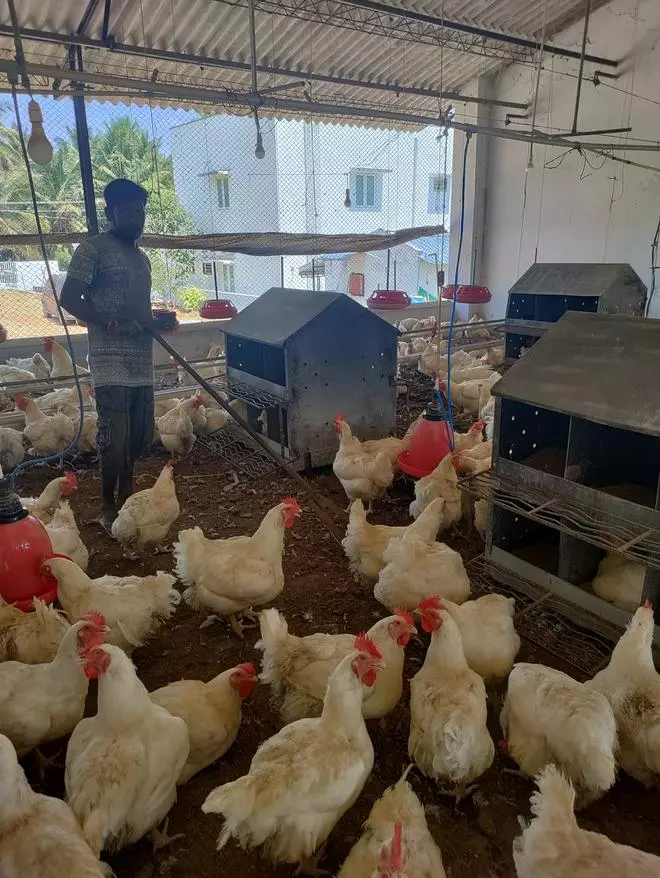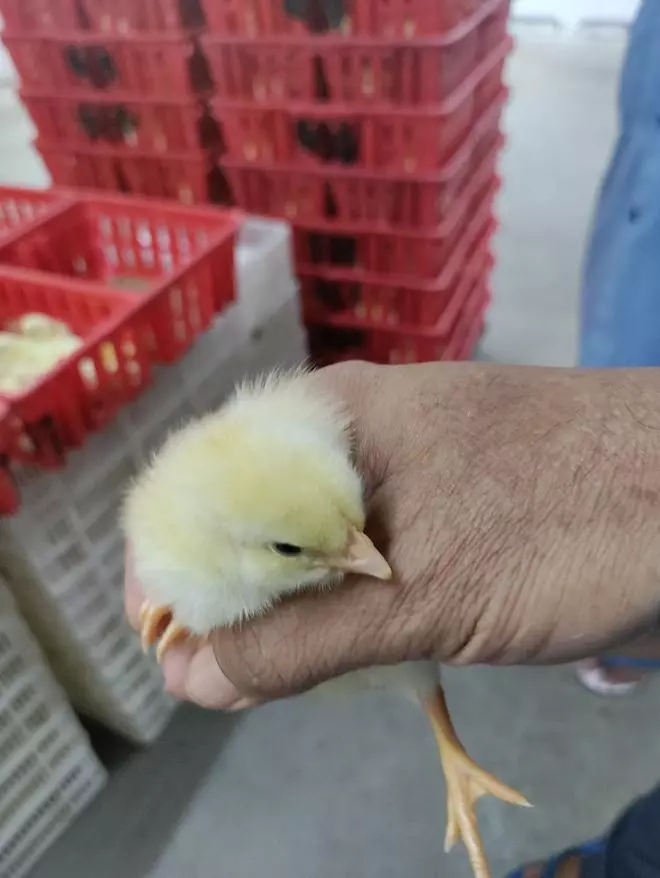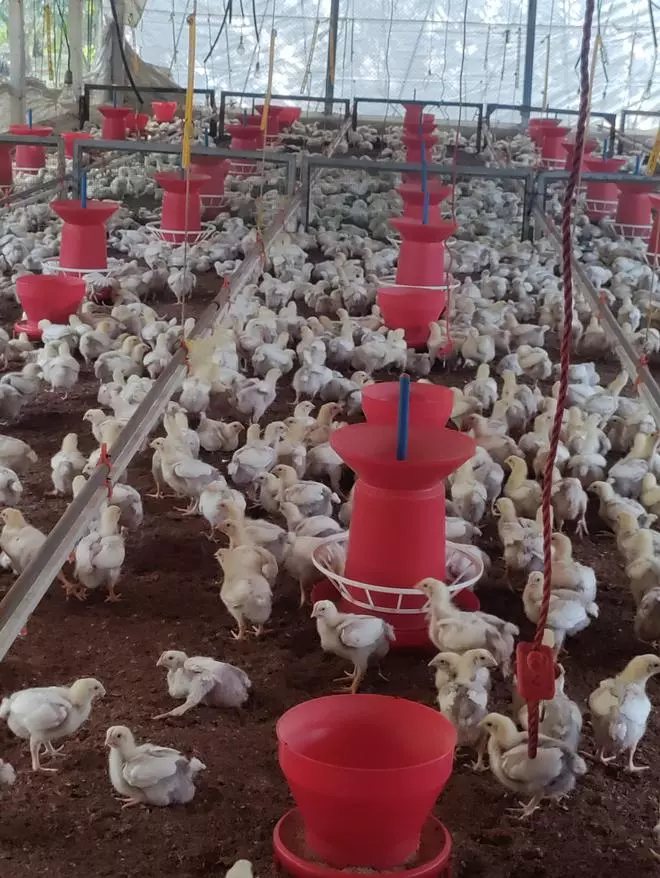

Two-week-old chicken enjoying themselves in the farm
His father seeded the idea of entrepreneurship; his mother lent him seed money of ₹5,000 to start a business. That was in 1984. Today, the turnover of the company that B Soundararajan and his brother founded back then boasts of sales exceeding ₹12,000 crore ($1.5 billion), and by the looks of it, the fun is just beginning.
Welcome to Coimbatore-based Suguna Foods Pvt Ltd, the country’s second-biggest poultry company whose next growth steps include an IPO within three years, stepping into its second African country (Uganda), a ₹100-crore new processing plant at Mysore, opening more retail outlets and promoting its new brand, ‘Delfrez’. (The country’s biggest chicken company is Venkateshwara Hatcheries Pvt Ltd, whose income from operations, according to a November 2022 CARE report, was ₹18,000 crore.)
In a recent chat, Soundarajan walked businessline through the company’s journey from its humble beginnings and gave a glimpse of its plans for the immediate future.

A worker loosening the earth in a breeder farm, where birds lay eggs that hatch
The striking message that came across in the conversation was the impact the company makes on rural India. The company began its innings by selling chicken feed to farmers; today it touches the lives of 42,000 farmers across 15,000 villages in India, who grow the just-born chicks for 42 days for a ‘growing free’ and turn over the adult birds back to the company.
Soundararajan’s parents were school teachers, who happened to have a bit of agricultural land. His father advised his two sons (B Soundararajan and G B Sundararajan, Director, Suguna Foods,) that rather than look for a job, they should try their hand at business. That little advice given in the distant past has touched off a wave of entrepreneurship—not only did the siblings take to business, but today their company is offering thousands of farmers an entrepreneurial opportunity.

A day-old chick
The farmer brings to the business only a thatched shed that is roomy enough for the growing birds, with wire-mesh walls and coir pitch floor, and a provision for piped water. He receives a ‘growing fee’ of ₹15 per bird. He gets to keep about ₹10, after deducting expenses—mainly, cost of capital, electricity and water.

A view of the shed in a farm where birds are given food, medicines and care, for 42 days
Suguna Foods provides the chicks as well as food and medicines for the birds and all the technical help in growing the birds. Soundararajan says that the average farmer grows 7,000 birds per batch, does five batches a year—that’s about ₹3.5 lakh of supplementary income. After 42 days, Suguna Foods takes back the grown-up birds and sells them to wet markets, hotels, and outlets like KFC. In recent years, however, Suguna has been processing a part of the bids and selling the meat, under the brand name, ‘Delfrez.’
Promoting the year-old brand is almost like starting a new business, bringing back to Soundararajan memories of the stressful, early days of the company. Things seemed to be going tough-but-okay with their business of supplying chicken feed on credit, until the economic downturn of 1990 triggered a domino of defaults.
Driven to the wall, Soundararajan took a close look at the supply chain and identified 14 middlemen, whose profits were adding to the costs. He tweaked his business model to eliminate them, braving their chagrin, and dogged on. In 1997, when the assorted partnership firms were consolidated into one entity, the turnover was ₹7 crore. By 2000, it was ₹100 crore.
The long-jump from ₹7 crore to ₹100 crore in three years was rather overwhelming, indeed scary. “But when we reached ₹100 crore,” reminisces Soundararajan, “it seemed like too small.”
Success fuels ambition and realizing that he had little formal management education, Soundararajan began attending short-term courses in various B-schools and even went abroad to see for himself how businesses are run, during which time the affairs of the business was managed by his brother. The business also spread from only the Coimbatore region to entire Tamil Nadu.
Andhra Pradesh Chief Minister Chandrababu Naidu had come to Coimbatore for some meeting, in 2001. Soundararajan decided to pay the Chief Minister a “courtesy call”. “I was shocked to see how much Mr Naidu knew about our business,” recalls Soundararajan. At the end of the conversation Naidu insisted that Suguna Foods should start business in his state. Soundararajan (also a Naidu) had never thought of moving out of Tamil Nadu, but the Chief Minister was insistent; Soundararajan took a hesitant step into Andhra Pradesh.
But for Chief Minister Naidu’s push, Suguna Foods may never have mustered up the courage to leave the cozy confines of its home state and go pan India. Andhra Pradesh gave the company the confidence to expand far and wide – West Bengal, Punjab. Year 2010—Suguna Foods’s turnover crossed the ₹3,000-crore mark.
The company’s model is simple. The model goes four generations deep--‘pure line’ hens, grandparents, parents, eggs and chicken. There is strict quality control at each level. The hatchery is the most crucial link in the chain, a sophisticated place entering which is like entering a US-FDA approved pharma plant.
Tens of thousands of eggs collected daily from the breeder farms are hatched under temperature-controlled conditions in large machines that keep tilting back and forth 90 degrees, to keep the liquid inside the eggs evenly spread out—or else, the hatching won’t be perfect. When the eggs hatch, out come the chicks—cute little things with their tiny beaks, yellow bodies and pink, wire-thin legs, and making an awful lot of noise. Every one of the chicks is manually vaccinated and placed in trays, stacks of which are trucked to the farmers on day-one.
Suguna Foods sells 10 lakh (1 million) tons of chicken annually. Except for the growing of the birds from day-one to day-42, which is outsourced to farmers, the company has complete ownership of the entire value chain. It runs its own vaccine plant, under Globion India Pvt Ltd, the chickenfeed is produced at another group company, Aminovit Feeds Pvt Ltd—300,000 tons a year—and the entire technical manpower is supplied by Suguna Institute of Poultry Management, (SIPM), which runs both a diploma course (for 260 students) and degree course (100 students), from its swanky, glitzy building in the middle of wilderness off the township of Udumalaipettai, 70 km from Coimbatore.
“There are jobs for all of them,” stresses Dr K Gajendran, Principal of the Institute, which is affiliated to Alagappa University. Suguna, which employs 9,000 people, can easily absorb all the students coming out of SIPM, but there is also demand from other poultry companies. “We want to create rural employment,” says Gajendran. SIPM graduates typically get jobs that pay ₹20,000 a month.
Today, Suguna Foods has over 60 feed mills, 70 hatcheries and four processing plants. The ownership of the full value chain and the resultant control over quality has given Suguna a sizable market share. The rating agency, ICRA, put the company’s market share at 15 per cent (of the broiler market) on a 2021-22 turnover of ₹10,754 crore. If the entire poultry market is estimated at about ₹2 lakh crore, Suguna can be said to have 6 per cent share.
An ICRA report of July 2022 shows net loss of ₹162 crore for the year, compared with a net profit of ₹364 crore for the previous year (turnover of ₹9,155 crore). “With the increase in commodity prices in FY2022, particularly for soyabean, operating margins dipped to 0.3 per cent in FY22 from 5.9 percent in FY21. This decline in margins amidst an inflationary environment led to increased working capital debt utilization to support cash flows,” notes ICRA.
Soundararajan says that the company would make a loss in the first three quarters but would turn in a profit in the fourth. He is unfazed about the loss, noting that it was essentially pandemic-induced because the company has been profitable all along.
ICRA notes that Suguna Foods’ liquidity position is comfortable. In July, the rating agency reckoned that the company would have cash flows of ₹200-250 crore in 2022-23, compared with repayment obligations of ₹100 crore. Moreover, Suguna Holdings Pvt Ltd, the holding company which has 99.7 per cent of Suguna Foods, had free cash and liquid investments of “over ₹300 crore as on March 31, 2022.”
Despite the comfortable cash balance, Soundararajan says raising equity has become necessary for the growth of the business—especially for increasing the share of processed chicken five times from the present 5 per cent and to build up the ‘Delfrez’ brand. Hence IPO. Soundararajan practically ruled out raising funds from private equity players—he believes that PE funds are more useful in the early stages of a company’s evolution, not when it is mature.
His plan is “capex of ₹300-400 crore every year”, primarily in opening more processing plants, to feed the company’s B2C ambition—selling meat directly to customers to supplement the B2B model of selling live birds to hotels, restaurants and caterers. ‘Delfrez’ is an offering brought about by changing market trends, says Soundararajan.
Earlier, a chicken buyer wouldn’t be convinced about its freshness unless a live bird was slaughtered in front of his eyes; but today, the youth, exposed to the supermarket culture, is happy buying a packet of refrigerated chicken meat. With its own brand, Suguna can (at last) fix the retail prices. The margins are good.
Today, Suguna Foods has 250-odd retail outlets on the franchise model and plans to add 100 each year till it reaches 1,000. Suguna, incidentally, also has another fledgling B2C business—soya. A processing plant in Nagpur produces soya meal and oil—the meal goes for making chicken feed and the oil is retailed under the brand name ‘Mother’s Delight’. The business contributed ₹600 crore to the total turnover in 2021-22.
Suguna Foods will step into Uganda soon, after its successful forays into Kenya and Bangladesh. In Kenya, the company supplies only feed and will soon start contract-farming, in Bangladesh, it deals with a thousand farmers.
Has Soundararajan failed too? Of course, he says. For a while, he dabbled into gold mining in Madagascar, but retreated hastily after figuring out that the business has high political overtones. But he also tried out another, farmer-allied business—dairy farming. The venture failed and the business was sold off. “One can’t succeed in everything,” he shrugs.
Published on March 7, 2023

Comments
Comments have to be in English, and in full sentences. They cannot be abusive or personal. Please abide by our community guidelines for posting your comments.
We have migrated to a new commenting platform. If you are already a registered user of TheHindu Businessline and logged in, you may continue to engage with our articles. If you do not have an account please register and login to post comments. Users can access their older comments by logging into their accounts on Vuukle.